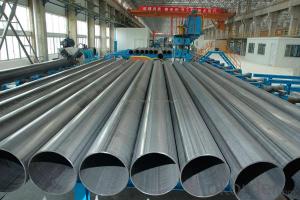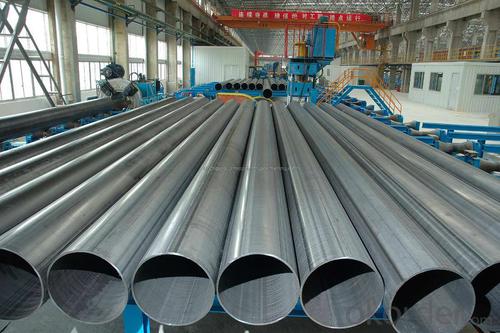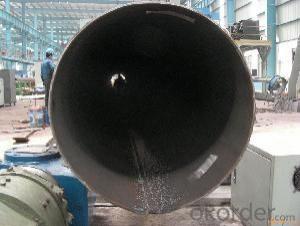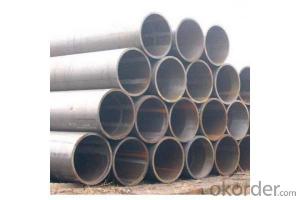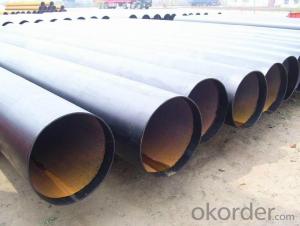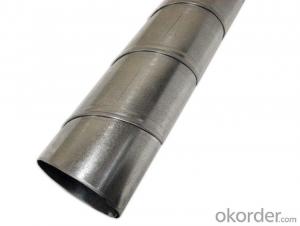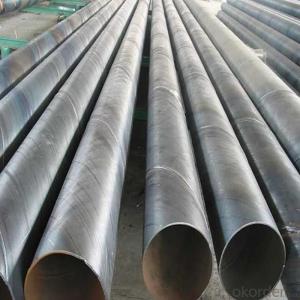LSAW SSAW CARBON STEEL PIPE ASTM API PSL1 16' 18'' 20'' 24'' 26'' 28''
- Loading Port:
- Tianjin
- Payment Terms:
- TT OR LC
- Min Order Qty:
- 1 m.t.
- Supply Capability:
- 3000 m.t./month
OKorder Service Pledge
OKorder Financial Service
You Might Also Like
Packaging & Delivery
Packaging Detail: | Normal exporting packing,in container or bulk vessel or as per clients' request |
Delivery Detail: | 2 months after confimed contract |
Specifications
Large Diameter API 5L X70 PSL2 LSAW Steel Pipe
Grade: X42, X46, X50, X52, X60, B, C
OD: 1.5"-28"
WT: SCH10-SCH160
Large Diameter API 5L X70 PSL2 LSAW Steel Pipe
Specifications:
u Standard: API 5L
u Grade: B, C, X42, X46, X50, X52, X56, X60, X65, X70, X80
u OD: 1.5"-28"
u WT: SCH10-SCH160
u Length: 5-12m
u Ends Finish: plain end, bevel end, grooved end
u Surface Treatment: bare, black varnished, oiled finish, red color, anti-corrosion, 3PE, FBE or epoxy coating
u Technique: hot rolled or cold drawn
u Application: api 5l steel pipe for conveying oil, water, gas
u Invoicing: based on theoretical weight or actual weight
u Payment Terms: L/C at sight, T/T or Western Union
u Trade Terms: FOB, CFR, CIF
u Certification: ABS manufacturing assessment, ABS design assessment, API 5CT, API 5L, DNV manufacturer certificate, ISO9001 quality management system certificate, ISO14001 environment management system certificate, GB/T28001 occupational health and safety management system certificate, A1 class manufacturing license of special equipment certificate, CCS, GL, LR, SGS, TüV, PDE
- Q: How are steel pipes tested for quality?
- Steel pipes are tested for quality through various methods, including visual inspection, non-destructive testing (NDT) techniques such as ultrasonic testing, magnetic particle testing, and radiographic testing. Additionally, mechanical properties like tensile strength, hardness, and toughness are evaluated to ensure the pipes meet the required specifications. Various standards and guidelines are followed to ensure the quality and safety of steel pipes.
- Q: What are the different methods of inspecting steel pipes for defects?
- There are several methods of inspecting steel pipes for defects, including visual inspection, magnetic particle inspection, ultrasonic testing, radiographic testing, and eddy current testing. Each method has its own advantages and limitations, and the choice of inspection method depends on factors such as the type of defect being searched for, the size and shape of the pipe, and the desired level of accuracy and sensitivity.
- Q: Seamless steel tube 89X4 meters, how heavy?
- The theoretical weight calculation formula of plain carbon steel and alloy steel seamless pipe:W=0.02466 (D-S) S, the density of steel fand 7.85kg/dmNote: weight per meter kg/m= (outer diameter wall thickness) * wall thickness *0.02466 units, mm: mmFor example, the seamless steel pipe with a diameter of 89*4 weight per meter:(89-4) *4*0.02466=8.384 kg / M.
- Q: How do you protect steel pipes from fire?
- There are several measures available to protect steel pipes from fire. One commonly used approach involves applying fire-resistant coatings or paints to the surface of the pipes. These coatings or paints are specifically designed to endure high temperatures and create a barrier that prevents heat from reaching the steel. Another effective method is to wrap the steel pipes with fire-resistant insulation materials. These materials serve as a buffer, reducing heat transfer and slowing down the spread of fire. Mineral wool or ceramic fiber blankets are commonly utilized for this purpose. It is also crucial to ensure proper installation and support for the steel pipes. This includes maintaining adequate clearance from other flammable substances and avoiding overcrowding or obstructions that could hinder the flow of air around the pipes. Sufficient spacing between pipes is also essential to prevent heat transfer between them. Moreover, incorporating firestop systems is recommended when steel pipes pass through fire-rated walls or floors. These systems consist of fire-resistant materials and seals that prevent the spread of fire and smoke through openings or penetrations in fire-rated barriers. Regular maintenance and inspections are essential to uphold the ongoing effectiveness of the fire protection measures. Any damage or deterioration of the coatings, insulation, or firestop systems should be promptly addressed to maintain the fire resistance of the steel pipes. In conclusion, a combination of fire-resistant coatings, insulation, proper installation, and maintenance practices is imperative for safeguarding steel pipes against fire hazards. These measures play a crucial role in minimizing the risk of fire-related damage and ensuring the safety of both the pipes and the surrounding environment.
- Q: How can steel pipes be protected from corrosion?
- Steel pipes can be protected from corrosion through various methods such as applying protective coatings, using cathodic protection techniques, implementing proper maintenance and inspection procedures, controlling water chemistry, and utilizing corrosion inhibitors.
- Q: How are steel pipes used in geothermal energy systems?
- Steel pipes are commonly used in geothermal energy systems to facilitate the transport of fluids, such as water or steam, between the geothermal source and the power plant. These pipes are designed to withstand high temperatures and pressures, ensuring the safe and efficient transfer of geothermal fluids. Additionally, steel pipes are used in the construction of geothermal wells, providing structural support and maintaining the integrity of the wellbore.
- Q: Can steel pipes be bent or shaped?
- Yes, steel pipes can be bent or shaped through various methods such as hot bending, cold bending, or using specialized machinery like pipe benders.
- Q: Can steel pipes be used for gas transmission pipelines?
- Yes, steel pipes can be used for gas transmission pipelines. Steel is a commonly used material for gas pipelines due to its strength, durability, and resistance to corrosion. Additionally, steel pipes can withstand high pressure and temperature conditions, making them suitable for transporting natural gas over long distances.
- Q: What are the advantages of using steel pipes in marine applications?
- There are several advantages of using steel pipes in marine applications. Firstly, steel pipes are highly durable and have a high resistance to corrosion. This is crucial in marine environments where pipes are constantly exposed to saltwater, which can cause rapid deterioration of materials. Steel pipes are able to withstand the harsh conditions and maintain their structural integrity for extended periods of time. Another advantage of using steel pipes in marine applications is their strength. Steel is a strong and robust material that can withstand the high pressure and extreme conditions often encountered in marine operations. This makes steel pipes ideal for transporting fluids, such as water, oil, and gas, in marine environments. Additionally, steel pipes offer excellent fire resistance. In the event of a fire on a ship or offshore platform, steel pipes can provide a reliable fire barrier, preventing the spread of flames and ensuring the safety of personnel and equipment. Furthermore, steel pipes are highly versatile and can be easily fabricated to meet specific requirements. They can be manufactured in various sizes, shapes, and thicknesses, allowing for customization to fit the specific needs of marine applications. Steel pipes can also be easily welded together, providing a seamless and leak-proof system. Lastly, steel pipes are cost-effective in the long run. Although the initial investment may be higher compared to other materials, the durability and longevity of steel pipes make them a cost-efficient choice. With minimal maintenance and a long lifespan, steel pipes reduce the need for frequent replacements, resulting in significant cost savings over time. In conclusion, the advantages of using steel pipes in marine applications include their durability, resistance to corrosion, strength, fire resistance, versatility, and cost-effectiveness. These factors make steel pipes a reliable and efficient choice for various marine operations, ensuring the safe and efficient transport of fluids in harsh marine environments.
- Q: How are steel pipes used in the manufacturing of telecommunications infrastructure?
- Steel pipes are commonly used in the manufacturing of telecommunications infrastructure for various purposes. They are primarily utilized for the installation of underground or overhead fiber optic cables and other telecommunication lines. Steel pipes provide durability, strength, and protection to the cables against external factors such as weather, vandalism, and other potential damages. They also offer the necessary support and stability for the installation of antennas, towers, and other equipment used in telecommunications networks. Additionally, steel pipes are used for the construction of conduits and ducts that house and protect the cables within a telecommunications system.
Send your message to us
LSAW SSAW CARBON STEEL PIPE ASTM API PSL1 16' 18'' 20'' 24'' 26'' 28''
- Loading Port:
- Tianjin
- Payment Terms:
- TT OR LC
- Min Order Qty:
- 1 m.t.
- Supply Capability:
- 3000 m.t./month
OKorder Service Pledge
OKorder Financial Service
Similar products
Hot products
Hot Searches
Related keywords
